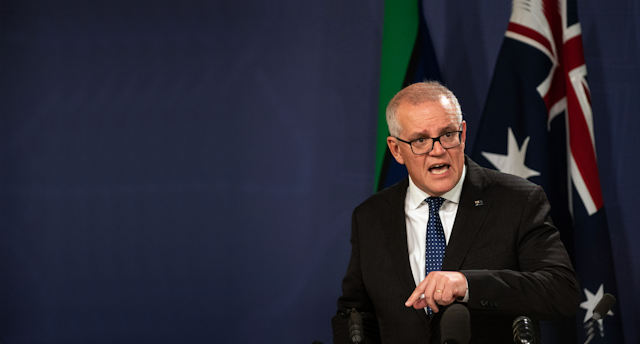Solicitor-General Stephen Donaghue has neatly summarised Scott Morrison’s political misdemeanour in having himself secretly appointed to all those ministries.
Morrison, by his failure to disclose what he had done, undermined the Westminster system of “responsible government” at the most basic level.
Ministers are responsible to parliament and, through parliament, to the voters. But how can there be that accountability if parliament and the public don’t know a (prime) minister has been appointed to administer a particular department?
As Anthony Albanese says, there remain outstanding questions in this affair. Despite his news conference last week, and more comments on Tuesday after the solicitor-general’s opinion was released, Morrison has not convincingly explained why he behaved in this strange way, with such discourtesy to colleagues, let along disdain for the public.
But whether we need a full legal inquiry is another matter. That smacks of current politics as well as past payback – for the investigations the Coalition government launched after it took office, into the “pink batts” scheme and into the trade unions.
Together, those royal commissions saw two former Labor prime ministers (Kevin Rudd and Julia Gillard) and a Labor opposition leader (Bill Shorten) giving evidence.
Labor would relish similar public pressure put on Morrison.
There’s no doubt what Morrison did was reprehensible. He was able to do it because of a gap in the political system’s safeguards, allowing for ministerial appointments to go unannounced.
But that gap is one which can be easily fixed, either by changes to rules or by legislation to ensure all such appointments have to be immediately disclosed.
Legislation would be best because once in place, it effectively couldn’t be undone. What government would try to repeal it, to allow secrecy again?
Going to an inquiry raises some tricky questions for the government, as it works out the detail of its terms of reference.
Prime among these is the matter of the Governor-General, David Hurley.
Hurley acted, properly, on government advice in ticking off on the Morrison appointments. But he also had the capacity to ask questions about what he was signing and, as far as we know, he didn’t do that. Hence there has been sharp criticism of him from some quarters.
From what we can judge, Albanese doesn’t want to embroil Hurley.
Asked whether the inquiry would examine Hurley’s role or exempt him, Albanese said: “Well, the governor-general’s role has been examined here [in the opinion]”.
Hurley had made “a very clear statement”, from his perspective, on how he operated, taking the advice of the government of the day, “which is consistent with the responsibility of the governor-general”, Albanese said.
The idea of the governor-general being asked to give evidence goes into awkward territory, even if it just exposed that Hurley wasn’t sharp enough to notice anything unusual.
But it is hard to figure how the governor-general can be carved out of an inquiry, if that inquiry is to get to the full story. This is especially so given the inquiry will look at the role of the prime minister’s department in preparing the request that was dispatched to Hurley. Clearly some bureaucrats will be in the frame.
Constitutional expert George Williams, from the University of NSW, is one who thinks Hurley’s role should not be excluded. Not because Hurley did anything wrong, but because “the governor-general was at the centre of the ratification”.
Williams would prefer a parliamentary inquiry, rather than one by a legal figure. “Parliamentarians should assert themselves in solving this problem”, he says.
The revelations about Morrison’s conduct have yielded a political bonanza for Albanese, and he will be hoping for more. Whether the inquiry will be seen in retrospect as justified, or political overkill, will depend on what it uncovers.
The solicitor-general’s opinion is another blow for Morrison’s record (and his quest for future employment), and for the Coalition as it tries to regroup.
Morrison, writing on Facebook on Tuesday, summarised his defence in these seven points.
the authorities established were valid
there was no consistent process for publication of such authorities
no powers were exercised under these authorities, except in the case of the PEP11 [gas exploration] decision, or misused
Ministers exercised their portfolio authorities fully, with my utmost confidence and trust, without intervention
as Prime Minister I did not ‘Act’ as Minister or engage in any ‘Co-Minister’ arrangements, except in the case of the PEP11 decision
on the PEP11 matter, this was done lawfully from first principles and my intent to do so was advised to the relevant Minister before doing so
Australia’s performance through the pandemic was one of the strongest in the developed world
He also said: “I will appropriately assist any genuine process to learn the lessons from the pandemic. I would expect that any credible processes would also extend to the actions of the States and Territories”.
But this inquiry is not one broadly into the handling of the pandemic. Albanese indicated a wider inquiry is still some time away.
Morrison can protest all he likes, but now that the appropriateness of his bizarre power grab has become an argument between him and the solicitor-general, he is on a hiding to nothing.

